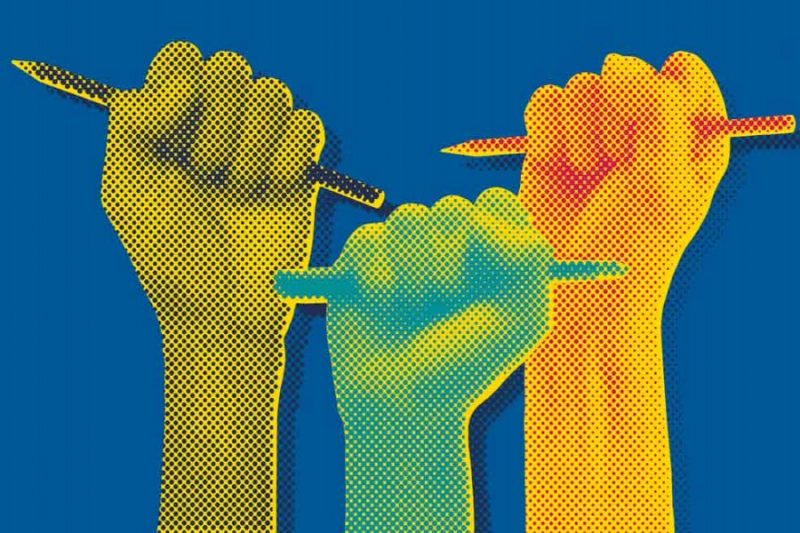
Journalists’ Union of Athens Daily Newspapers condemns litigation against journalists and their sources which aims to threaten their financial survival



On December 8, 2021, the Journalists’ Union of Athens Daily Newspapers issued a statement protesting big business’ ‘strategy of financial extermination’, which is intended to obstruct journalistic investigation by threatening the financial livelihoods of journalists and their sources. Lawsuits filed against citizens who speak to journalists amount to intimidation, they say, attempting to control information by hindering journalists’ access to it.
This statement was prompted by lawsuits filed by the company ONEX against the Environmental Quality Observatory of Syros and two members of the organisation who participated in three radio interviews, where they expressed the dissatisfaction of island residents with pollution produced by the Onex Neorion Shipyard. The company is asking for compensation of one million euros from each member of the Observatory and another one million euros from the Observatory itself, a sum totalling three million euros.
“This Union has long argued that journalistic coverage of public affairs, always in full respect of the Code of Ethics, ensures the free formation of public opinion and strengthens the demand for transparency, which is all the more urgent today in the context of widespread misinformation and fake news.”
Law 1178/81 regulates the basic legal framework of lawsuits against journalists and the media (Government Gazette AD187/16.7.1981 – On civil liability of the press and other provisions). The Journalists’ Union of Athens Daily Newspapers has called for its repeal, arguing that the law has created the legal basis for a lawsuit industry whose sole purpose is to silence the press and journalists. These lawsuits, they state, are essentially aimed at obstructing investigative journalism and at threatening the financial survival of the media and journalists.
The failure to adopt an effective legal framework for dealing with SLAPP lawsuits effectively leaves the media, journalists and organisations vulnerable to abusive legal attacks by powerful politicians or large multinationals who have the financial means to litigate repeatedly against financially weaker media and journalists in order to silence them. This phenomenon ultimately harms the freedom of the press, which is protected by Article 14 of the Constitution.
As such, the state must take immediate measures to protect against these abusive legal attacks. In fact, the need to adopt such measures is supported by both the European Commission and the European Parliament. The Commission is currently preparing a proposal for a directive to “protect journalists and human rights defenders in strategic lawsuits against public participation (SLAPP).”
In November 2021, the European Parliament also voted in favour of a report calling for new rules within the EU, “to counteract the threat that Strategic Lawsuits Against Public Participation (SLAPPs) pose to journalists, NGOs and civil society in Europe.” SLAPPs, they say, are frivolous legal actions based on exaggerated and often abusive claims, aiming to intimidate and professionally discredit their targets, with the ultimate objective of blackmailing and silencing them. Among the measures proposed by the European Parliament is the establishment of rules on early dismissal by the courts so that abusive lawsuits can be stopped quickly based on objective criteria; the claimant should face sanctions if they fail to justify in what way their action is not abusive.
In a state that adheres to the rule of law, both individual rights and the freedom of the press are protected. Journalists have the right to practice their work freely and independently, without censorship or influence. Article 14 of the Constitution guarantees the freedom of the press, and the Journalists’ Union of Athens Daily Newspapers condemns the campaign of litigation against both journalists and their sources which threatens journalism itself. They call for the immediate adoption of measures to protect journalists, the media and members of civil society from abusive legal attacks against them, as advocated by the European Commission and the European Parliament.
Bank Account number: 1100 0232 0016 560
IBAN: GR56 0140 1100 1100 0232 0016 560
BIC: CRBAGRAA
![]()
In a time where the very foundations of democracy are gradually being eroded by the rise of extreme nationalism, alt-right movements, the spread of disinformation and corporate capture, the efforts of organisations such as Vouliwatch are more relevant than ever.
We rely on the generosity of each and every one of you to continue with our efforts for more transparency and accounta
By financially supporting Vouliwatch you support our litigation strategy, our campaigns for transparency and accountability in the political system, the development of new civic tech tools, our research projects and last but not least our impartial and accurate